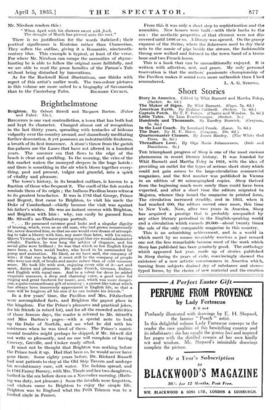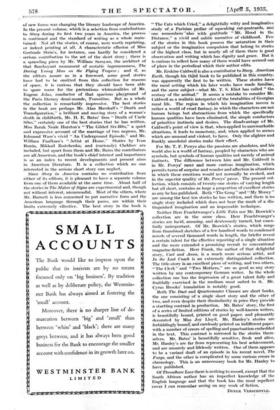Short Stories
Story in America. Edited by Whit Burnett and Martha Foley. (Barker. 8s. 6d.)
7s. 6d.) Press. 3s. 6d.)
Threadbare Love. By Olga Marie Johannessen. (Bale and DanieLsson. 6s.) Tim triumphant progress of Story is one of the most curious phenomena in recent literary history. It was founded by Whit Burnett and Martha Foley in 1031, with the idea of providing an outlet for the types of serious short story which could not gain access to the large-circulation commercial magazines, and the first number was published in Vienna in an edition .of 80 mimeographed copies. Story thrived from the beginning much more surely than could have been expected, and after a short time the editors migrated to Majorca, whence they issued the magazine in printed form. The circulation increased steadily, and in 1933, when it had reached 600, the editors moved once more, this time to New York. Now, after two years in America, Story
has acquired a prestige that is probably unequalled by any other literary periodical in( the English-speaking world and a circulation which exceeds 20,000—about twenty times the sale of the only comparable magazine in this country.
This is an astonishing achievement, and in a world in which merit by no means invariably receives a just reward one not the less remarkable because most of the work which
Story has published has been genuinely good. The anthology which appeared last year, made up of stories published in Story during its years of exile,. convincingly showed the existence- of a new artistic consciousness in America which, turning from subjects drained dry of substance and stereo- typed forms, by the choice of new material and the creation of new forms was changing the literary landscape of America. In the present volume, which- is a selection from contributions to Story during its first two years in America, the process is continued and the standard of writing as a whole main- tained: Not all the stories, of course, were worth reprinting, or indeed printing at all. A characteristic effusion of Miss Gertrude Stein's, for instance, can hardly be considered a serious contribution to the art of the -short story ; there is a sprawling piece by Mr. William Saroyan, the architect of that flamboyant monument of ecstatic ingenuousness, The Daring l'oung Man on the Flying Trapeze ; and if, as the editors assure us in a foreword, some good stories have had to be omitted from this collection for reasons of space, , it is curious that they should have been able to spare room for , the pretentious whimsicalities of Mr. Eugene Jolas, conductor of that spacious playground of the Paris literary demi-monde, Transition. But as a whole the collection is remarkably impressive. The best stories in the book are perhaps Mr. Alan Marshall's "Death and Transfiguration," a brilliant and moving story of a woman's death in childbirth, Mr. H. E. Bates' firm Death of Uncle Silas," certainly one of the best stories that he has written, Miss Zorah Neale Hurston's "The Gilded Six-Bits," a quiet and expressive account of the marriage of two negroes, Mr. Edmund Ware's vivid "An Underground Episode," and Mr. William Faulkner's "Artist at Home." Stories by Ivan Bunin, Mikhail Zo4chenko- ,- and (curiously) Chekhov are included, but apart from them and Mr. Bates the contributors are all American, and the book's chief interest and importance is as an index to recent developments and present aims in American literature. It is a collection which no one interested in the serious short story can neglect.
Since Story in America contains no contribution from either of its editors, it is pleasant to have a separate volume from one of them available at the same time. About half of the stories in The Maker of Signs are experimental and, though not without interest, unsuccessful. Most of the others, where Mr. Burnett is less concerned to put narrative form and the American language through their paces, are within their limits extremely effective. The best story in the book is
"The Cats which Cried," a delightfully witty and imaginative study of .a Parisian pedlar of squeaking cat-postcards, and one remembers "also with gratitude "Mt. Hood in the Distance," a vivid and subtle narrative of childhood. Few of the stories in this book possess the saturation in their subject or the imaginative compulsion that belong to stories of the highest class, but in nearly all of them there is good observation and writing which has dignity and grace. But it is curious to reflect how many of them would have seemed out of' place in the periodical which their author edits.
Mr. Erskine Caldwell is also a contributor to Story. American Earth, though his third book to be published in this country, was apparently the first to be written. These stories have the rural setting which his later works have made familiar, and the same subject—what Mr. T. S. Eliot has called "the ecstasy of the animal." It seems a mistake to consider Mr. Caldwell as a realistic interpreter of the brutalities of Georgian rural life. The region in which his imagination moves is rather a world of cruel fantasy, in which the characters are not human beings but abstractions from which the specifically human qualities have been eliminated, the simple conductors of primitive instincts and desires. The disadvantage of Mr. Caldwell's point of view is that, when applied to unremarkable situations, it leads to monotony, and, when applied to scenes which are unusual and violent, to farce. Only the slighter and frankly anecdotal stories make their effect.
For Mr. T. F. Powys also the passions are absolutes, and his world also is a world of fantasy, peopled by characters who are symbols, but symbols of human qualities not merely of animal instincts. The difference between him and Mr. Caldwell is in Mr. Powys' rarer and more curious imagination, which permits turns of surprise and wonder and affection in situations in which these emotions would not normally be evoked, and in the superior quality of Mr. Powys' prose. The present col- lection, which consists of twenty-one stories of varying length but all short, contains as large a proportion of excellent stories as any he has published. Both "The Gong and "My Money" are among the best ten stories he has written, and there is no single Story included which does not bear the mark of a dis- tinguished imagination and an impeccable technique.
Neither Herr Feuchtwanger's Little Tales nor Mr. Beswick's collection are in the same class. Herr Feuchtwanger's stories are lucid, amusing, and dexterously turned, but essen- tially unimportant. Of Mr. Beswick's stories, which range from thumbnail sketches of a few hundred words to condensed novels of several thousand words in length, the briefer reveal a certain talent foi the effective reporting of a single situation and the more extended a promising recruit to conventional magazine-fiction. Herr Frank, the author of that delightful story, Carl and Anna, is a much more serious artist, and In the Last Coach is an extremely distinguished collection. The title-story is an excellent piece of writing, and two others,
"The Clerk" and "Two Mothers," are as good as any story written by any contemporary German writer. In the whole collection one has the impression of a great talent fully and fruitfully exercised in the medium most suited to it. Mr. Cyrus Brooks' translation' is notably good.
Both The Duet and Quartermaster Clausen are short books, the one consisting of a single short story and the other of
two, and even despite their dissimilarity in price they iirovide a startling contrist in production. Mr. Bates' story, the first
of a series of limited editions of stories by well-known writers, is beautifully bound, Printed on good paper, and pleasantly decorated by Miss JO Lloyd. Mr. Hanley's stories are
forbiddingly bound; and carelessly printed on indifferent paper,
with a number of errors of spelling and punctuation embedded in the text. This contrast is mirrored in the stories them- selves. Mr. Bates' is beautifully sensitive, fresh and alive, Mr. Hanley's are far from representing his best achievement, and are unsurely and lifelessly written. One of them appears to be a variant draft of an episode in his recent novel, The Furys, and the other is complicated by some curious errors in chronology. This is an unnecessary book for Mr. Hanley to have published.
Of Threadbare Love there is nothing to record, except that the South African author has an imperfect knowledge of the English language and that the book has the most repellent cover I can remember seeing on any work of fiction. ,
DEREK VERSCHOYLE.











































 Previous page
Previous page